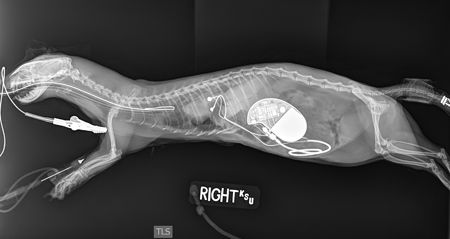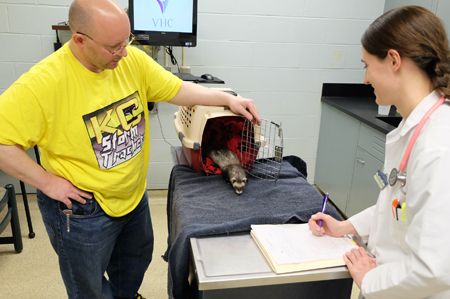Highlights from the world of ferret medicine
Here's an update on adrenal disease therapy for these more unusual veterinary patients, plus the adventure of Zelda, a rare recipient of a pacemaker thanks to Kansas State University.
We'll avoid the obvious pun and say that we searched around and found some news in the world of medicine for these domesticated polecats. (OK, OK. We ferreted it out. It's impossible to resist!)
Longer-lasting drug therapy for adrenal disease
We've heard about possible ill effects of early spaying and neutering in dogs and cats, but you likely know this can be harmful in ferrets as well, causing adrenal disease.
“It's generally thought to be caused by an overstimulation of the adrenal glands in the absence of the negative feedback provided by the gonads in these early spayed and neutered animals,” Julia Whittington, DVM, of the exotic animal medicine department at the University of Illinois Veterinary Teaching Hospital, told dvm360 at a recent CVC.
Surgery used to be the go-to fix, but Whittington says for around the last 10 years, the treatment of choice has become gonadotropin-releasing hormone (GNRH) analog therapy in the form of leuprolide acetate injections (Lupron-Abbott Laboratories), which last six to eight weeks. But Whittington says a longer-lasting treatment has caught on that involves administering deslorelin instead. The deslorelin is administered through an implant in affected ferrets and is effective for three to six months.
Whittington added that an important part of treating these animals is light cycle therapy, “making sure that they have really no more than about 10 hours of daylight in any given day,” she says. Hear the whole story from Whittington in the video below.
Zelda's legendary journey to heart health
In other ferret-related news, a team of veterinary specialists at the Kansas State University (KSU) Veterinary Health Center recently pitched in to install a pacemaker in a ferret-a first of its kind endeavor for the university, according to a KSU release.
Christopher Norkus, DVM, DACVAA, CVPP, (who, coincidentally, had been a resident at KSU) diagnosed third-degree atrioventricular block in Zelda, one of three ferrets owned by Carl Hobi, after Hobi noticed she was inappetent and lying down more than usual. Norkus saw Zelda in Pennsylvania while Hobi was traveling and recommended that a pacemaker be implanted by specialists at KSU when Hobi was back home in Kansas.
At KSU, exotics specialists James Carpenter, DVM, DACZM; David Eshar, DABVP (exotics), DECZM; and intern Louden Wright, DVM, did the initial examination of Zelda, along with cardiologist Justin Thomason, DVM, DACVIM.
Thomason implanted the pacemaker in Zelda with the help of Emily Klocke, DVM, DACVS, and David Rankin, DVM, MS, DACVAA.

A postoperative radiograph of the pacemaker in Zelda. (Photos courtesy of Kansas State University Veterinary Health Center)
“This was the first time I had ever performed this particular procedure on a ferret, although I have performed it on dogs before," Klocke says in the K-State release. "I was very concerned about how small our patient was and whether I could successfully suture the pacemaker leads to her beating heart without causing severe bleeding. Our anesthesia service, led by Dr. David Rankin, was instrumental in the success of this procedure.”
Zelda came through surgery well, staying in ICU for two days before going home with Hobi.
"Dr. Klocke's work was truly magical," says Eshar. "There are only a few millimeters of space within the heart's wall for suturing the leads from the pacemaker. The pacemaker is the same as what would be used in a human patient, but we had to order a special set of leads for Zelda, since these would not be inserted through the veins. It's a very delicate procedure to make everything work correctly.”
And since the pacemaker battery lasts for 10 years, Zelda should live a normal lifespan. So her adventure continues …

A follow-up visit for Zelda, with her owner Carl Hobi and fourth-year veterinary student Hilary Coulombe.